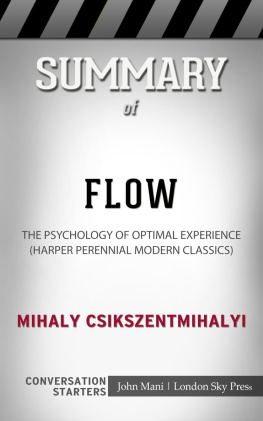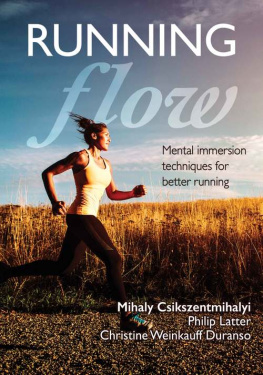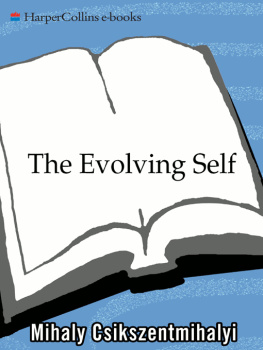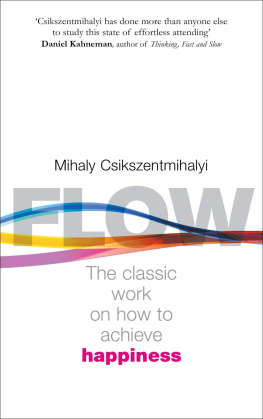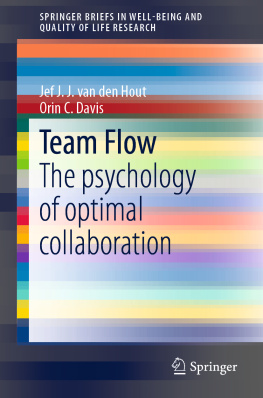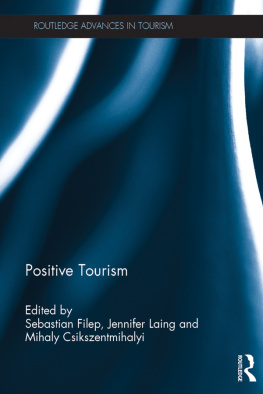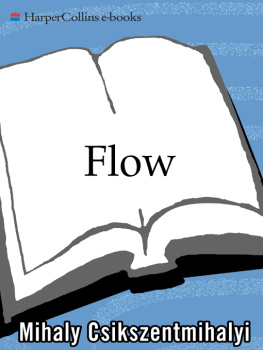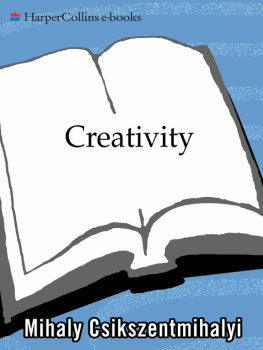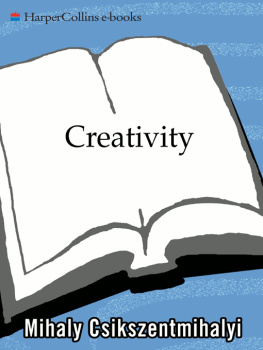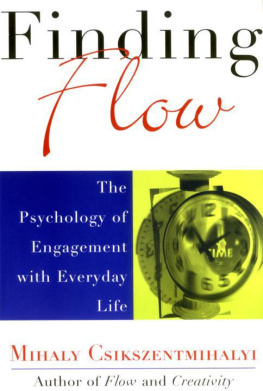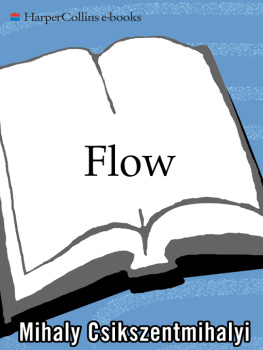
Cambridge University Press
Cambridge
New York New Rochelle Melbourne Sydney
Published by the press Syndicate of the University of Cambridge The Pitt Building, Trumpington Street, Cambridge CB2 1RP 32 East 57th Street, New York, NY 10022, USA 10 Stamford Road, Oakleigh, Melbourne 3166, Australia
Cambridge University Press 1988
First published 1988
Printed in the United States of America
Library of Congress Cataloging-in-Publication Data Optimal experience.
Bibliography: p.
Includes index.
I. Consciousness. 2. Consciousness - Cross-cultural studies.I. Csikszentmihalyi, Mihaly.
II. Csikszentmihalyi, Isabella Selega. [DNLM:
1. Consciousness. 2. Cross-Cultural Comparison.
BF 311 062]
BF311.063 1988 153 87-24289
British Library Cataloguing in Publication Data Optimal experience : studies of flow in consciousness.
1. Consciousness - Religious aspects
2. Psychology and religion
I. Csikszentmihalyi, Mihaly
II. Csikszentmihalyi, Isabella Selega 291.2'2 BL53
ISBN 0 521 34288 0
For Mark and Christopher
Contents
Acknowledgments Contributors | page xi xiii |
I A THEORETICAL MODEL OF OPTIMAL EXPERIENCE |
| Introduction MIHALY CSIKSZENTMIHALYI | |
| The flow experience and its significance for human psychology MIHALY CSIKSZENTMIHALYI | |
| Sociological implications of the flow experience RICHARD G. MITCHELL, JR. | |
| Flow and biocultural evolution FAUSTO MASSIMINI, MIHALY CSIKSZENTMIHALYI, AND ANTONELLA DELLE FAVE | |
II VARIETIES OF THE FLOW EXPERIENCE |
| Introduction to Part II MIHALY AND ISABELLA CSIKSZENTMIHALYI | |
| Bosozoku: flow in Japanese motorcycle gangs IKUYA SATO | |
| Women, work, and flow MARIA T. ALLISON AND MARGARET CARLISLE DUNCAN | |
| The relationship between life satisfaction and flow in elderly Korean immigrants SEONGYEUL HAN | |
| Flow and writing REED LARSON | |
| Flow in solitary ordeals RICHARD D. LOGAN | |
Ill | FLOW AS A WAY OF LIFE |
| Introduction to Part III ISABELLA AND MIHALY CSIKSZENTMIHALYI | |
| Modernization and the changing contexts of flow in work and leisure ANTONELLA DELLE FAVE AND FAUSTO MASSIMINI | |
| Ocean cruising JIM MACBETH | |
| Flow in a historical context: the case of the Jesuits ISABELLA CSIKSZENTMIHALYI | |
IV | THE MEASUREMENT OF FLOW IN EVERYDAY LIFE |
| Introduction to Part IV MIHALY AND ISABELLA CSIKSZENTMIHALYI | |
| The systematic assessment of flow in daily experience FAUSTO MASSIMINI AND MASSIMO CARLI | |
| The quality of experience in the flow channels: comparison of Italian and U.S. students MASSIMO CARLI, ANTONELLA DELLE FAVE, AND FAUSTO MASSIMINI | |
| Flow and the quality of experience during work and leisure JUDITH LEFEVRE | |
| Optimal experience and the uses of talent | |
JEANNE NAKAMURA |
| Self-esteem and optimal experience | |
ANNE J. WELLS |
| Optimal experience and the family context | |
KEVIN RATHUNDE |
| The future of flow | |
MIHALY CSIKSZENTMIHALYI |
References | |
Name index | |
Subject index | |
Acknowledgments
In the years since we first started studying flow so many people have helped with ideas, moral support, and financial funding, that it is not humanly possible to give each of them the credit due. Nevertheless, it is a pleasure to remember here those persons who have left a particular mark on the development of the research reported in this volume. No one will ever know how important their encouragement and support have been in furthering these difficult investigations. This token of thanks should not, however, place any responsibility on their shoulders for any weaknesses in our work.
The first studies on the flow experience were funded by the Applied Research Branch of the National Institute of Mental Health. The more recent developments have been supported by the Spencer Foundation, whose Board has exercised over the years a very beneficial influence on innovative research in the behavioral sciences. We should like to thank personally the former president, Thomas James, and the executive director, Marion Faldet, for their patience and understanding.
At the University of Chicago the friendship and encouragement of Bernice Neugarten and Jacob W. Getzels have always been very dear to us. Norman Bradburn, Robert Butler, Donald Fiske, John MacAloon, and Salvatore Maddi all have done work in areas related to this volume, and with their scholarship they have helped the development of our ideas. Donald Levine and Edward Laumann have provided moral support with their interest on numerous occasions.
Of scholars at other universities Donald Campbell of Lehigh has been a model of how psychologists could apply their thoughts rigorously to areas outside their immediate field. Jerome Singer of Yale and M. Brewster Smith of Santa Cruz have been attentive and judicious critics of our work. With Howard Gardner of Harvard and David Feldman of Tufts we have had many pleasant and stimulating exchanges through the years. Jean Hamilton, now in private medical practice in Washington, D.C., was an early friend and collaborator who has continued to work in this area. Of the many colleagues whose influence is evident in this volume we should like to single out Richard deCharms of Washington University in St. Louis; Edward Deci and Michael Ryan of Rochester; Edward Diener, Jack Kelly, and Douglas Kleiber at the University of Illinois, Urbana; Mark Lepper of Stanford; and Brian Sutton-Smith of the University of Pennsylvania. Three journal editors have been particularly helpful in disseminating the research on flow: Thomas Greening of The Journal of Humanistic Psychology; Ladd Wheeler of the Review of Personality and Social Psychology, and John Broughton of New Ideas in Psychology. The interest and encouragement of Ralph Burhoe, founder of the Institute on Religion in an Age of Science, and of Philip Hefner, its current president, have also been important. Of those who have presented the ideas contained in this volume to a wider public we should mention Daniel Goleman, now with The New York Times, Robert Cross of the Chicago Tribune, John McCormick of Newsweek, and Michael Dibb, who produced documentaries for the BBC.
Among colleagues abroad we wish to acknowledge Professors Hans Aebli at the University of Berne in Switzerland; Michael Argyle at Oxford University, England; Hermann Brandstetter at the University of Linz, Austria; James Crook, of Bristol University, England; Marten De Vries at Limburgh University in Maastricht, Holland; Heinz Heckhausen of the Max-Planck Institute in Munich, Germany; Hiroaki Imamura at Chiba University, Japan; Elisabeth Noelle-Neumann at the University of Mainz, Germany; Ivan Vitanyi at the Center for Research in Culture in Budapest, Hungary; and in Canada Roger Mannell and Jiri Zuzanek at Waterloo University; Len Wankel at the University of Alberta; and Gerald Kenyon at the University of Lethbridge.


